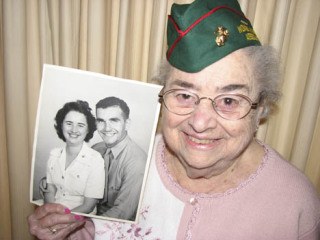Woman recalls turning point in her life as Marine
Published 3:35 pm Wednesday, March 18, 2009
Determined to join the war effort, Viola Borstein refused to settle for a job at a massive assembly plant, customized tool in hand.
Such a small-cog-in-the-large-wheel assignment didn’t exactly fit her personality. She was a leader, ahead of her time, an eager and adventurous young woman willing to pursue challenges and master tasks as a self-assured quick study.
“I was one of the pathfinders,” she said as her eyes lit up, sitting comfortably inside her Auburn home, feisty and fit at 87. “I could do many things.
“I went into the service to do a job, to make a difference – that was my whole belief.”
Borstein was one of the few, the proud – one of the more than 20,000 women who had served in the U.S. Marine Corps by the end of World War II.
The American Legion Auxiliary recently honored area women veterans, such as Borstein, and other active duty service women during a special luncheon in Auburn.
Women performed a significant role then, and they play a more prominent role in the armed forces today, especially in combat.
Women have been proving their strength as Marines since Opha Mae Johnson enlisted in 1913, but it wasn’t until 1943 that the Marine Corps Women’s Reserve officially was established.
Borstein was among the pioneers.
As a 21-year-old New York University graduate, she wanted to join her brother, Howard, an Army lieutenant, in the fight.
“I was looking for a job … and all they wanted to do was put me in a factory,” said Borstein, who grew up in an upper middle class family in Flushing, N.Y., the daughter of Jewish Hungarian immigrants. “I didn’t want to do that. I wanted to join the service.”
Borstein tried to enlist in the Army, but was turned away. Undaunted, she stepped across the street on Church Street in New York City where she noticed a campaign poster of a woman proudly clad in a Marine dress uniform, standing tall and saluting the sky.
She stepped inside and soon was sworn in after gaining the approval of her father, who immediately left his textile factory to witness the oath.
“I told him this is what I wanted to do,” Borstein added.
As a Marine, Borstein was physically and mentally well prepared for boot camp. She was a swimmer who had learned how to fence and ride a horse as a youngster. She was considerably stronger than her 5-foot-1, 100-pound frame would suggest and more mature than others.
She blossomed into a good soldier, serving nearly three years in the Corps as a corporal. Stationed at air bases along the Eastern Seaboard, primarily at Cherry Point, N.C., Borstein served in a variety of roles – from gunnery instructor to driving the general’s jeep, from supervising the mess hall to teaching a number of classes.
Women Marines performed more than 200 military assignments. In addition to clerical work, they also filled positions as parachute riggers, mechanics, radio operators, motor transport support, photographers, control tower operators, cryptographers, mapmakers and welders.
Back then, few women soldiers went overseas to the combat theater.
“I grew up. I became very independent,” she said of her experience. “I became very self-sufficient … not afraid of anything. Whereas before, I was very naive.”
2 Marines meet
It was in the service that Borstein met her husband, Paul, a Marine master sergeant and an aerial reconnaissance photographer who flew missions in the South Pacific.
“He was a charming, warm, fun-loving man who always had a story to tell,” Borstein said.
They were married for 53 years. They raised two daughters and a son in Connecticut. They enjoyed the good life, devoting themselves to family, friends and helping others. Paul, a salesman, contributed greatly to philanthropic organizations and supported a school for special-needs children.
The Borsteins opened their house to friends, even to those going through rough patches.
Viola worked as a school teacher, performed civic duties, even served as a justice of the peace in her New England town.
The Borsteins traveled the world, and spent their golden wedding anniversary touring Australia.
Paul died in 1998. Viola eventually moved to the Northwest to be closer to her daughters.
“We all became who we are because of them,” said daughter Linda Morris, a Lake Tapps resident. “They lived a very fine, very fun life.”
Living in Auburn
Today, Borstein is happy to spend her twilight years in a quiet Auburn retirement community. She remains a great storyteller with a sparkle in her eyes, the family’s matriarch of many talents, among them her legendary cooking and baking.
She also remains a part of the Women Marines Association, a civilian non-profit veterans association that supports many programs, including scholarships to veterans and their families.
Many women Marine veterans received little recognition or support for their duty. Many have. Borstein, for one, feels she did her small part to be included in the 66-year history of the women’s Corps.
“I feel like I did the job, and I did it well,” she said. “I appreciate the fact I was a part of it.
“It was a great experience, the turning point in my young life.”





